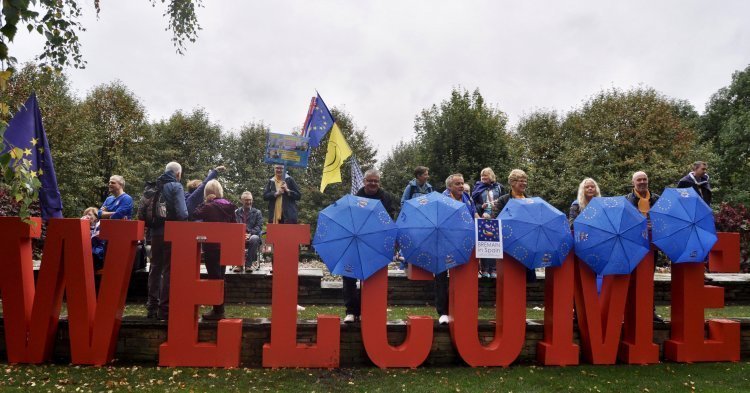Let’s not forget
Dear Rémi Laurent,
In your column you argue that “the responsibility for Brexit lies with the British and you speak of a decision ‘made by the British people, alone and in their sovereignty”. You are admittedly speaking to Tony Blair, but in your remarks you differentiate very little between the elites and the citizens of Britain. Yet this difference is, to me, crucial.
Let’s not forget that the referendum on whether or not to leave the EU by the United Kingdom is the result of a series of political opportunities seized by the English establishment (which Tony Blair is part of, I quite agree). Since 2003 David Cameron has carefully eliminated the majority of the Europhiles in his party, a strategy to ensure his appointment as the leader of the Conservatives in 2005 and then to become head of government in 2010. The organisation of this referendum was a campaign promise intending to seduce UKIP voters and to gain a majority in Parliament in 2015. What a success!
Let’s not forget that the electoral campaign leading up to the referendum was catastrophic, whether on the side of Leave or Remain. How do you convince a population, who you have just bombarded with the so-called wrongdoings of the EU, to stay in it? The Brexiteers themselves refrained from thinking about the real consequences of leaving, stringing together a series of promises each one more populist than the last.
Let’s not forget that even the referendum question was very ambiguous: ‘Should the United Kingdom remain a member of the European Union?’ How do you respond to such a vague question when the decision is so fraught with consequences? This ambiguity explains the debate which immediately followed the results, a debate which is still being had a year and a half later: Hard Brexit or Soft Brexit? A point which should have been raised well before arranging the referendum.
Let’s not forget that the English political system is not designed for tools of direct democracy such as referendums. The United Kingdom is particular in that is does not have a written constitution. There are therefore no formal provisions for the principles of the organising of a referendum. We can give the counter-example of Switzerland, whose political system is based on a semi-direct democracy. For a popular initiative to be adopted, i.e. a referendum asking for a change to the federal constitution, it must be accepted by half the population, but also by a majority of the cantons, which they call a “double majority”. A referendum like Brexit, the result of which is liable to have an impact as important as a change to the constitution, should have been regulated with stricter criteria.
If we had had this referendum in France at exactly the same time, no one could have guaranteed that the French citizens would not have made the same choice.
Brexit is still far from achieving a consensus in the United Kingdom
What you neglected to say is that Tony Blair feels that Europeans should “keep an open mind” in case “the British change their minds”. It is indeed the second part of this remark which is important. You can discredit Tony Blair as much as you like, but the current climate in the United Kingdom is indeed that.
On 23 June 2016, Leave won a narrow majority of 51.9%. A recent survey shows that 49% of the British are still convinced by Brexit. We are therefore far from unanimity and it is even noticeable that majorities are very tangible. Moreover, the Scottish and Northern Irish voted to remain in the EU.
In 2017, numerous events conspired to complicate the government’s plans regarding negotiations with the EU, the loss of the majority in Parliament being a major one. But the attempts of this same Parliament to reassert itself in this parliamentary monarchy are equally interesting. A major one, led by the conservative MP Dominic Grieve, was successful.
More recently, a group of MPs launched a legal action for the European Court of Justice to give a ruling on a potential reversal of Brexit. Can the United Kingdom stop the process of Article 50 without the approval of the 27 other member states?
Brexit is therefore far from achieving a consensus in the United Kingdom. It is of course unthinkable that the EU should make any concessions during the Brexit negotiations, but a reversal of the referendum is now plausible. Even Nigel Farage is concerned about it!
Let us remain open to the citizens of Britain
Admittedly, the United Kingdom’s support of the European project in 1973 can be explained by economic and pragmatic reasons, but it is an error to think that France signed the European Coal and Steel Community Treaty solely for reasons of peace and solidarity. The federalists gained influence during the Second World War, but the nation states were the ones that created the first steps towards a European community, aimed above all to protect the economic interests of each member. It is therefore not surprising that today the European Union is strongly criticised for its lack of democracy and for its deregulation of the markets. It is not just the British who are unhappy with it.
We should not boast about having elected “the most pro-European of the candidates to the Presidency” when we know to what extent the presidential elections in France have been complicated. Especially as Emmanuel Macron certainly benefitted from the jolt after Brexit, as you say yourself. It is sad to be aware that a member country has to decide to leave for the national and European elites to react.
Since the results of the referendum in June 2016, the British people have never before heard so much about the EU and its functioning. They are not only becoming aware of the “harsh reality” and “what that involves”, they are also discovering the series of failings of their consecutive governments that has been occurring for decades. All the national problems previously attributed to the EU are now being brought to light.
If Brexit were to be reversed, the British people would surely have a completely new attitude towards the European project. If they change their minds, we Europeans should keep the door open to them.
The future of Europe is at stake
Before saying “Thank You and Goodbye!”, we should show our solidarity rather than revenge.
We should not delude ourselves: Brexit will affect the most vulnerable people first and not the English establishment, who bear primary responsibility for the results of the referendum. Should we be wishing for an economic recession, for the middle and working classes to become poorer, for public services to be privatised, for a very uncertain future for the British people, until now our fellow European citizens?
The consequences for Europeans linked to the United Kingdom will be very serious. First of all there are the 3 million: 3 million people living in the United Kingdom who are worried about losing their rights. But above all there are these mixed couples and their children who are finding themselves in much more complicated situations. Let’s not forget that free movement and the mixing of populations are two very big strengths of the European project.
The current revival of European construction will be inevitably marred by the United Kingdom leaving and the European project will the weakened. At a time when Brexit is more uncertain than ever, we should remain open to the British people. The British political class will inevitably have to be re-evaluated and regenerated. It will be another United Kingdom that makes its comeback. At the same time, the EU must continue its efforts to give more democratic control to its citizens.





Follow the comments: |
|
